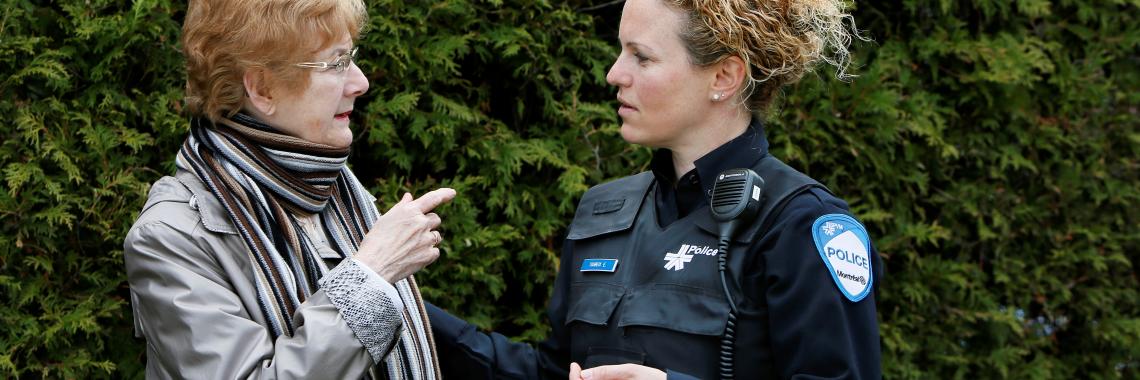
IPRAS – Integrated Police Response for Abused Seniors
Context
World population ageing brings opportunities and challenges that have been recognized since 2002 with the adoption of the Madrid international plan of action on ageing by the United Nation's World Assembly on Ageing. One of the three commitments taken by the participating countries was the creation of enabling and supportive environments. Cities have a major role in promoting environments where people of all ages can live together. By 2031, nearly one out of four Montrealers will be over 65 years old (500 000 persons). As all cities in the world, Montreal is not immune to the phenomenon of elder abuse. In 2015 in Montréal, 25% of cases brought to the attention of the police department concerned persons who were cohabiting. Abusers are often neighbours, acquaintances or family members. Social workers also noted an increase in the number of seniors among the homeless. Police officers are and will be increasingly called upon to ensure the safety of seniors and to intervene in case of mistreatment. Mistreatment is a single or repeated act, or lack of appropriate action, occurring within any relationship where there is an expectation of trust which causes harm or distress to an older person. It can be committed by a family member but also by relatives, neighbors, service providers, etc. The most conservative estimates indicate that between 4-7% of people over 65 living at home would be mistreated and many cases remain unreported. As first responders, police officers are called to intervene in different mistreatment situations, at home or in nursing homes.
Objective
The IPRAS model aims to empower police officers to recognize mistreatment situations and to take action in partnership with public health, social and justice services, as well as non-profit organizations (NGOs).
Implementation
A partnership between the Research Chair on Mistreatment of Older Adults at the University of Sherbrooke and the Service de police de la Ville de Montréal (SPVM) gave rise to this 3-year action research project, funded in part by the Government of Canada through the New Horizons for Seniors Program. A large study documented the current police practices within the SPVM, elsewhere in Canada and around the world and targeted the needs of SPVM police officers regarding intervention with older adults. The results were used to develop an operational model, test it in a pilot project and evaluate the implementation and effects before implementing it in within the entire SPVM.
The IPAM model comprises 57 actions, declined in practices. These practices include: prevention tools developed and translated in several languages; a detection tool that facilitates the recognition of mistreatment signs; an operating mode and an intervention procedure that define the roles of police officers in detection, first-line intervention, follow-ups - in synergy with those offered by the appropriate services and agencies-; investigation and judicial process. Collaborations with public health and social services and community organizations are clarified and strengthened.
Online training is offered to police officers. "Resource officers" guarantee coordination of intervention with mistreated older adults at a local, regional and corporate level. A communication plan ensures model dissemination within the police and community. Model`s evaluation allows its continuous adjustment.
Observed outcomes
Patrol officers feel better equipped to detect mistreatment situations, more comfortable in their interventions with older adults and developed more reflexes to report non-criminal situations.
The identification of new partners has facilitated collaborations in follow-ups.
Interventions in duo, between a police officer and a practitioner of public or community health and social services network, are consolidated.
Police presence in non-criminal situations helps prevent mistreatment and allows providing security to older adults.
The IPAM model was implemented throughout the entire island of Montreal in May 2016. It will be subject to an impact assessment in 2018.
City
Owner

